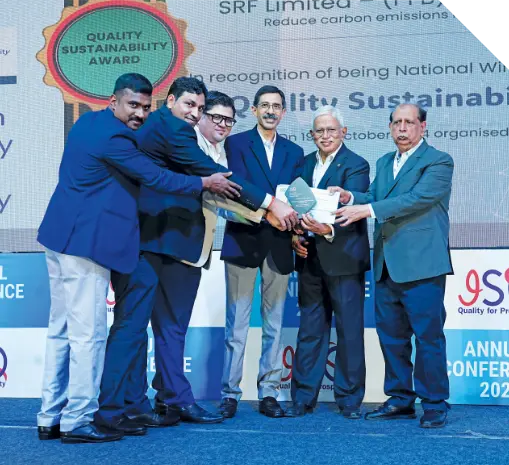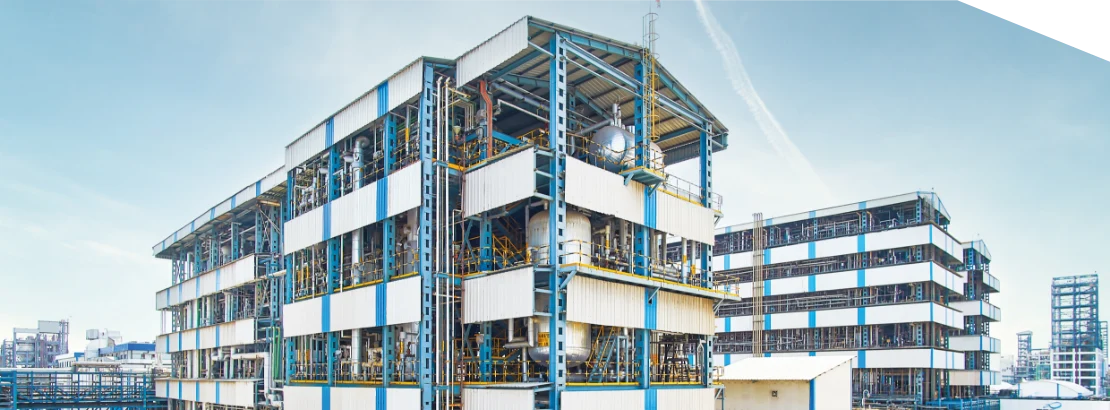X
of Capital Expenditure
state-of-the-art manufacturing locations across five businesses
Exports
new products added during the year
Higher sales volume
Businesses should provide goods and services in a manner that is sustainable and safe
Customers | Employees | Suppliers
Occupational Health & Safety | Key Material Procurement and Management
Total Quality Management | Employment | Innovation, Research & Development
By leveraging advanced technologies and practicing world-class production practices, we ensure consistent delivery of reliable, high-quality solutions. Our diverse product portfolio is thoughtfully designed to offer sustainability, versatility, and enhanced value to our customers.
We produce organic and inorganic intermediates that are used across multiple applications, including material sciences, surface chemistry, as well as in the agrochemical and pharmaceutical industries. Our manufacturing units are designed to efficiently support high production volumes for both the agrochemical and pharmaceutical sectors, ensuring consistent quality and to meet market demand.
We manufacture a wide range of chemicals including refrigerant gases such as R22 and HFC blends, chloromethanes, specialty chemical intermediates, hydrofluoric acid, and PTFEs. Our production facilities in Dahej (Gujarat) and Bhiwadi (Rajasthan) are fully equipped to meet the market demand for these products. With robust backward integration for key inputs like refrigerant gases, industrial solvents, and PTFE, we have mastered operational efficiency and established a strong competitive edge in the fluorochemicals sector. Our Fluorochemicals Business reported strong performance during the year owing to higher volumes and realisations of HFCs across domestic and export markets and, record domestic sales of refrigerant gases, driven by highest-ever R32 production.
Since its inception, the Performance Films & Foil Business has steadily grown and strengthened its capabilities. Starting with the commissioning of its first PET line in 1995 and BOPP line in 2013, the business has significantly expanded its operations. Today, it operates six advanced PET lines and two backward integrated resin plants and four BOPP lines across globe. The manufacturing setup includes BOPET and BOPP production, supported by value-added facilities such as coating, metallisation, and surface modification to meet evolving market needs. Performance Films & Foil Business has a state-of-the-art aluminium foil manufacturing plant in Indore, Madhya Pradesh. This facility, located in Jetapur, is part of a broader packaging solutions offering that includes BOPET and BOPP films. The plant is equipped with European technology and precise process controls, enabling the production of high-quality aluminium foil.
Our products are integral to our customers’ supply chains. We provide our customers with flexible packaging solutions for food items like confectionery, dairy, and spices, as well as non-food products such as perfumes, shampoos, and detergents. Recognising that our manufacturing processes directly impact individuals’ lives, we prioritise quality at every step. In addition, our industrial packaging is essential in sectors like air ducting, cables, solar panels, and electronics, contributing to both digitisation and sustainability for our customers. In foil business our product goes for Food and Non-Food Packaging, Pharmaceutical Packaging, Household/Kitchen Foil etc.
As one of the largest manufacturers of both standard and specialty Bi-axially Oriented Polyethylene Terephthalate (BOPET) and Bi-axially Oriented Polypropylene (BOPP) films, we proudly offer our products under the PETLARTM and OPLARTM brand names. This extensive portfolio positions us as a key player in the packaging film industry, providing innovative, high-quality solutions that cater to the diverse needs of our customers. PFB witnessed healthy growth in revenue and margins driven by higher volumes and realisations for both BOPP and BOPET, increased sales of high-impact VAPs and Aluminium foil.
We are the largest manufacturer of technical textiles in India and hold a global leadership position in most of our product categories. With four advanced manufacturing plants located in Madhya Pradesh and Tamil Nadu, we offer variety of products including Nylon-6 Tyre Cord Fabrics, Chips, Industrial Yarn, and Polyester Tyre Cord Fabric.

Owing to positive market demand, our TTB segment achieved highest-ever production and sales in the year for Tyre Cord Fabrics, Polyester Industrial Yarn and Belting Fabrics.
Our Gummidipoondi plant in Tamil Nadu boasts state-of-the-art facilities for yarn manufacturing, weaving, coating, printing, and lacquering. It is fully integrated to produce coated fabrics using PVC formulations. We offer a diverse range of fabrics, with weights ranging from 350 gsm to 1500 gsm and coating thicknesses from 0.3 mm to 1.5 mm, available in over 100 different shades.
Our Kashipur facility in Uttarakhand has the capacity to produce 75 lakh sqm of laminated products each month, including cold laminated front-lit, cold laminated back-lit, and hot laminated protective covers. The manufacturing process is equipped with advanced fabrication machines featuring automatic heat-sealing technology, enabling us to efficiently produce high-quality tarpaulins.
At SRF, our management philosophy continues to be firmly anchored in the principles of Total Quality Management (TQM). This system is pivoted around three key aspects: addressing the evolving needs of our customers and stakeholders, utilising data-driven systematic methodologies, and fostering a culture that endeavours to evolve every employee in continuous improvement across all functions and levels of the organisation. TQM practices in our Company span the entire value chain – from product conceptualisation, development, projects, manufacturing operations, and sales, to the support and enabling functions to achieve superior outcomes across Quality, Cost, Delivery, Safety, and Morale (QCDSM).
In FY25, we focussed on capability building through flagship problem-solving programmes, broadening leadership engagement, and scaling up through digital interventions. The organisation has elevated its level of problem-solving initiatives in both manufacturing and non-manufacturing domains and encouraged broader workforce participation.
Building on these initiatives, the PSP Silver program continued to evolve, leveraging advanced data analytics and machine learning tools. This program saw the completion of 13 projects, and we continued to expand our certification pool as a recognition of solving high-impact problems. Overall annualised savings from problem solving projects was over ₹ 70 Crores.
As part of digital transformation, we established a common methodology for IT initiatives aligned with TQM principles. Internal processes have been simplified through the deployment of RPA and BI tools. Integration of process control, daily management analytics, and anomaly detection was implemented through Digital Twin solutions at two manufacturing sites. Additionally, the TQM knowledge base was strengthened by expanding internal platforms, making continuous improvement resources more accessible across the organisation.
Leadership engagement remained a key priority. A renewed TQM program was conducted for all Top and Senior Management, re-establishing the management way and practices for the future. Furthermore, a tailored “Sponsor as Facilitator” program was introduced for leaders to deepen their involvement in improvement initiatives.

To strengthen our shopfloor improvement and people participation, the Chemicals business significantly expanded their TIE groups – autonomous workmen-led teams – reaching over 373 groups. These groups carry out basic improvements daily, reducing small breakdowns with full workforce participation. The Company-wide improvement showcase, the 17th Annual Themes Convention, recorded the highest-ever participation, with over 530 employees presenting impactful improvement projects. In addition, more than 15,440 Kaizens were implemented, reflecting strong grassroots improvements. The businesses also won 92 external Quality Control Circle (QCC) competitions during the year.
In addition, a renewed business capability assessment was conducted for one business unit during the year, with improvement areas built into the annual plan for the coming year. The management plans to extend the revised structured assessment approach to all other businesses in the coming year. These initiatives are a testament to our unwavering commitment to institutionalising a culture of excellence, innovation, and employee-driven improvements. We are focussed on continuously evolving our quality systems to meet emerging challenges and deliver long-term value to all stakeholders.
Ensuring raw material efficiency is a crucial element in our sustainability strategy. It helps in enabling us to reduce environmental impact, optimise costs, reduce emissions and waste generation. To foster resource efficiency, we place a strong emphasis on efficiently using virgin raw material and increasing our recycled input material from our total raw material consumption. We work on innovative applications to increase our recycled content in the production process through continuous product re-engineering, while also ensuring the highest quality. This approach minimises our environmental footprint and reduces waste through promotion of material recycling and repurposing.

*Total recycled input material used ~3,450 MT (including PET chips & PP chips)
Increases production efficiency, reduce operational costs.
Helps in providing data and insights that further enhance intellectual capital through learnings and innovation
Equips workforce with better resources to perform their tasks, increasing their efficiency and productivity
Adopting sustainable manufacturing practices and green technologies leads to resource conservation
Enhances stakeholder trust and reputation